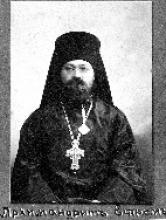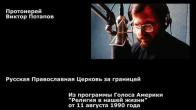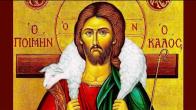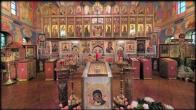You are here
New Hieromartyr Ephrem, Bishop of Selenga
23 August / 5 September
 Bishop Ephrem (in the world, Epiphany Andreevitch Kuznetsov) was one of those zealous and devoted servants of the Russian Church who was among the first to feel the great persecutions visited upon Orthodoxy. He was born in 1876 into a family of Trans-Baikal Cossacks. His life began in sorrows and trials.
Bishop Ephrem (in the world, Epiphany Andreevitch Kuznetsov) was one of those zealous and devoted servants of the Russian Church who was among the first to feel the great persecutions visited upon Orthodoxy. He was born in 1876 into a family of Trans-Baikal Cossacks. His life began in sorrows and trials.
As he recollected in 1916, "In my early childhood, the Lord made me an orphan, a state that in peasant society was accompanied by poverty, deprivation, and sickness. However, that Cross taught me humility, patience, understanding of my neighbor's suffering, and compassion. Under the weight of that Cross, my heart was softened, and my faith in God, my hope in His ineffable mercy in my life's path, was strengthened.
As he was dying, the father instructed his son to study. However, the youth, who tended stock for his relatives and tilled the land in order to have something to eat, could expect only to finish the village school. However, Divine Providence prepared the youth Epiphany for a particular form of service. A compassionate village priest turned his attention to the boy, when Vladyka Benjamin (Blagonravov) of Irkutsk was passing through the village, he took the opportunity to have Epiphany kneel before the bishop, and, vouching for the fact that the boy would dedicate himself to the service of the Church, asked the bishop to accept him into the religious school on at least a partial scholarship.
Several decades later, Archimandrite Ephrem related warm recollections of his experienced instructor, the stern and pious Archpriest, rector of the Chita Religious School, who "with an able hand sowed the seeds of faith and piety in the hearts of the students."
Upon completing school, Epiphany got a taste of the sweetness of service, by serving as the chanter in the village church. He understood his situation and knew that possibilities [for advancement] were limited, and he did not think of doing anything greater. But once again, God's intentions for him were revealed. "The Lord instilled in the heart of one of my teachers the idea of sending, as something of a test, a telegram to that same Most-reverend Benjamin, with a request that I be admitted to the seminary as a scholarship student. That removed what had seemed to me an insurmountable obstacle, and pinned hopes about my life's new path on the heart of His hierarch...."
In 1898 Epiphany Kuznetsov graduated from the Irkutsk Seminary, and was ordained to the priesthood. He served in his native town. In the second year of his pastoral service, he was visited with a great sorrow: the death of his wife. The young priest suffered enormous grief. A source of great comfort was the involvement in his life of Archbishop Evsevy of Vladivostok, who knew him from his days as rector of the Irkutsk Seminary. Fr. Epiphany treasured him and later called him his spiritual father. Profoundly commiserating with the young pastor, Archbishop Evsevy sent him several epistles filled with paternal love. Vladyka persuaded him to pursue further advanced theological studies. In 1903 Fr. Epiphany graduated from the Kazan Theological Academy. He was awarded the degree of Candidate in Theology. He remembered the Academy rector – the future Metropolitan Anthony (Khrapovitsky, 1863-1936) – with particular gratitude, and described him as "a holy hierarch of our times who is distinguished by the excellence of his intellect and the purity of his life."
During this period, Fr. Epiphany Kuznetsov demonstrated a great interest in missionary work, and in 1904 commenced his missionary activity as part of the Trans-Baikal Mission.
Having been tonsured with the name Ephrem, he was elevated to the rank of Abbot, and in 1909, to the rank of Archimandrite.
Appointed to head the Trans-Baikal Religious Mission, he successfully pursued the task of converting the pagans. He was especially successful in preaching to the local Koreans. The local Korean converts formed a separate parish in Chita. The clergy of the Mission church consisted of a Korean priest and a Korean chanter, who bore the responsibility of being spiritual directors for the Orthodox Koreans. A catechetical school for them was opened for them, and a Korean-language magazine, Orthodoxy, was published, to enlighten and bring into the bosom of the Orthodox Church Koreans not only the Koreans of Trans-Baikal, but also those living throughout the Far East.
Archimandrite Ephrem's work in the missionary field also resulted in his becoming closer to Hieromartyr Archpriest Vostorgov, who in his capacity as Synodal missionary, would visit Trans-Baikal.
Archimandrite Ephrem not only directed all missionary activity in the huge diocese (at the beginning of the 20th Century encompassing 539,601 versts [1 verst = 1.07 km], i.e. an area greater in size than Germany as it then existed), but also assisted the ruling bishop with diocesan matters.
On November 20, 1916, Archimandrite Ephrem was consecrated to the episcopate, and made Bishop of Selenga, a vicariate of the Trans-Baikal Diocese. Principal celebrant of his consecration was Archbishop Eusevy (Nikolsky) of Vladivostok. At the rite of election to the episcopate, Archimandrite Ephrem spoke of the responsibilities of serving as a hierarch: "I recognize how exalted is the calling which is before me and the service in the Church of God, and I know that purity of faith, greatness of piety, strength of knowledge, and indestructible dedication are essential in [order to perform] it; I know that this service is confirmed not in external rule over God's estate, in self-adulation or dominance, but rather in the internal strength of spirit, formed in faith and love, strengthened and made firm through humble-minded acceptance of Christ's yoke. I recognize as well that attendant to such exalted service is great responsibility, especially in our days, when particular powers are required both to bring order to the interior church life of the faithful and to extend the Kingdom of God toward the non-believers."
Bishop Ephrem's Episcopal service lasted for less than two years, during which period the most difficult trials befell both the Church and every one who served It. The Most-reverend Ephrem worthily endured those trials.
Bishop Ephrem took part in the work of the Holy Local Council of 1917-18 as an alternate delegate. He substituted for Meletiy, Bishop of Trans-Baikal and Nerchinsk.
In late January or early February 1918 he sent a telegram from Moscow to Bishop Meletiy of Transbaikal, telling of the religious mood prevalent under conditions of incipient persecution against the Church: "The Council convened on the 20th. The Patriarch declared that the Church was being persecuted. He anathematized the persecutors, and called the faithful to [come to its] defense, and to martyrdom. On January 28, there was a general prayer. Red Square, Resurrection Square, and the adjoining streets were completely filled with the faithful, just like during Matins for Pascha. The mood was one of delight."
The words of the telegram "The Patriarch… called the faithful… to martyrdom," get your attention. That is the way the text of the Patriarchal Encyclical was interpreted: "And if it should become necessary to suffer for the work of Christ, we call upon you, beloved children of the Church, to meet those sufferings go along with us."
The Most-reverend Ephrem was one of those clergymen of our Church who, several months later, was among the first to accept holy martyrdom.
After the conclusion of the Holy Council (April 1918), Vladyka Ephrem remained in Moscow. On June 2, 1918 he was arrested by the CheKa at Archpriest John Vostorgov's apartment. While incarcerated, he showed himself to be a resolute and courageous confessor.
On August 23 (September 5) 1918, the day of commemoration of Hieromartyr Irenaeus of Lyon, a zealous preacher of the Christian Faith and an uncompromising warrior against the heresies, Vladyka Ephrem was executed by firing squad on Khodinsk Field. He calmly met his death for Christ's sake. Before his execution, he blessed the other prisoners who were about to be executed.
The indictment in the matter of Citizen Vasily Ivanovitch Belavin (Most-holy Patriarch Tikhon)… M., 1923, cited an excerpt from a private letter from His Holiness the Patriarch to Metropolitan Anthony (Khrapovistsky). Regarding the execution of Bishop Ephrem along with other Church representatives, it states "Perhaps their fate is better than [that facing] us who are left behind."
It was with a great spiritual struggle that life ended for the Holy Hierarch, who had manifested purity of faith, great heights of piety, and an indestructible dedication.
PARISH LIFE
Address of our Cathedral
Subscribe to our mailing list
While all the materials on this site are copyrighted, you may use them freely as long as you treat them
with respect and provide attribution on the Russian Orthodox Cathedral of St.John the Baptist of Washington DC.









